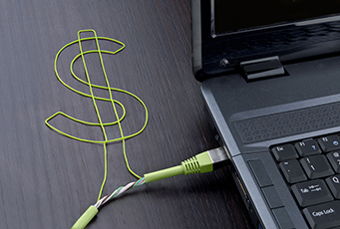Are you buried in paper? If “junk” mail is overtaking “real” mail, maybe it’s time to take control. Opt-out of the unnecessary mailbox clutter; get bills electronically; and regularly purge your paper files.
It’s April, and many of us are finishing our tax returns while vowing to be more organized this year. Unbelievably, the Solid Waste Management Coordinating Board reports that Americans receive more than 30 pounds of junk mail per year! Adding necessary and important documents to the mix makes it easy to get buried in all that paper. Here’s how to de-clutter while retaining the important stuff.
Opt-Out
The best ‘”de-clutter” option is to stop the unnecessary paper from coming into your mailbox. Unless you wish to remain in the market for a better credit card or additional life insurance, unsubscribe from pre-approved offers. The Fair Credit Reporting Act allows consumers to submit an online form at www.OptOutPrescreen.com and opt-out from receiving these mailers for five years. You can permanently opt out by completing an online form and a paper confirmation. You will reduce your mail and eliminate the risk that those credit card offers might fall into the wrong hands!
Get Automated
Have you considered going paperless? Bills, account statements, and supporting documentation can often be sent electronically. An automated bill-payment program will eliminate a ton of paper records as well. But don’t stop there! Look for accounts that can be consolidated or closed. For example, consider closing that charge card you opened at a specialty store when on vacation last year. But hold on to useful credit cards you’ve had for a long time. They can boost your credit score!
Organize and Purge
Once you’ve removed the clutter from your mailbox, start organizing your filing system. But before you can make headway there, know how long to retain certain documents. The general rule of thumb is to save documents used for tax preparation for seven years.
What to Keep
- Bank accounts - Keep monthly statements that include copies of canceled checks until you prepare your tax return for that calendar year. For tax purposes, bank deposit records for gifts and other large non-payroll-related cash receipts should be retained for seven years as evidence of the source of funds. Note: Check with your financial institution to confirm how long they maintain statements. You may not need to save hard copies of the information that can be accessed electronically.
- Credit cards - Retain credit card statements until that year’s tax return is filed. However, if needed for long-term tax records, keep them with your return.
- Paid invoices and bills - Unless tax-related, you can discard them once the payment has been confirmed.
- Paychecks - Only keep the final pay record for the year, which shows the annual totals.
- Investment accounts - Retain records for seven years that contain the cost of investments that have been sold. “Purchase” and “sale” confirmations can be disposed of once the transaction is confirmed on your statement. Most investment firms provide access to these forms online so you likely don’t need to keep paper copies.
- IRAs - It’s important to retain records showing non-deductible contributions to an IRA. These contributions are reflected on Form 8606. Keep for seven years after you close your IRA.
Insurance Policies
- Home and Auto - Retain the policy until there is no possibility of a claim, the policy has been replaced, or when you no longer own the property.
- Life - Dispose of terminated policies only when there is no cash value and no chance of reinstatement (usually five years).
- Health - Dispose of policy only after it has expired or lapsed, and credible coverage documentation is no longer necessary.
- Insurance claims - Maintain documentation at least one year after payment of a claim or, if tax-related, for seven years.
Summary
Proactively managing your mail and documentation delivery methods will save you time and help with better organization of your records. Identifying which documents to keep versus those you can safely toss, and throwing away those that you can, will also help. These two tasks should help make next year’s tax preparation a bit more bearable!
Schedule a Consultation
We have helped our clients answer these questions and more. If you want a clear understanding of your financial future, and need help making changes to reach your goals, schedule a consultation and we can get started.
Recommended Articles
Business Entities – Choosing the Appropriate Structure
The decision on how to structure your business can be an...
Check Etiquette: Who Should I Make My Check Payable To?
A question we are often asked by clients is: “Who should...





